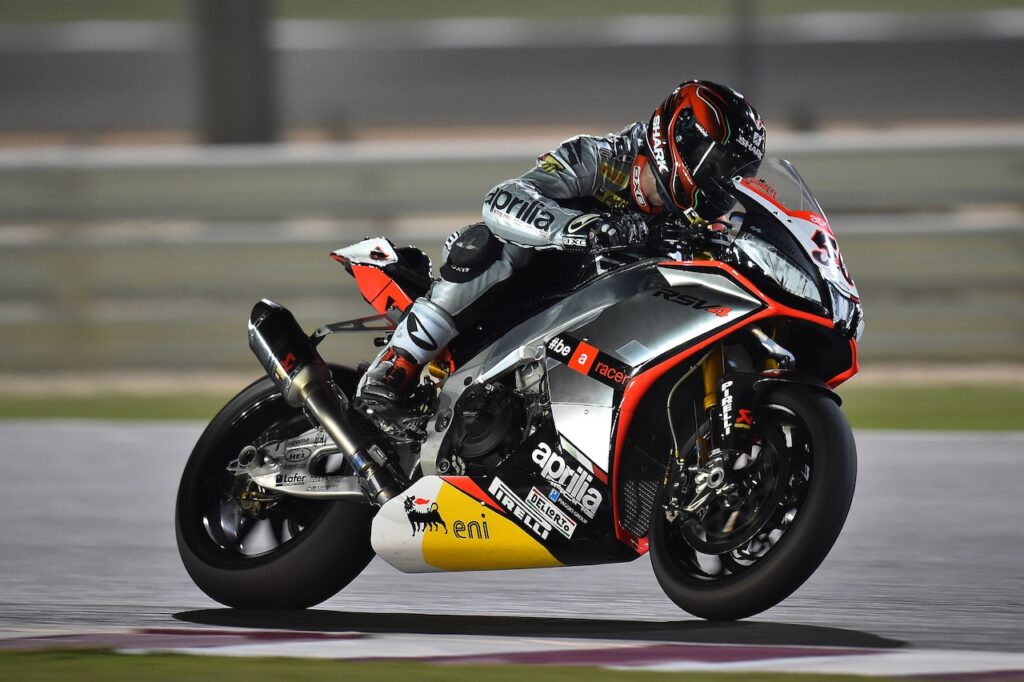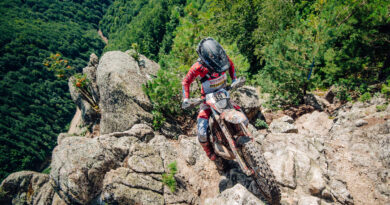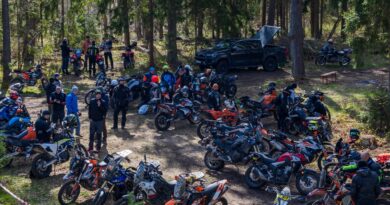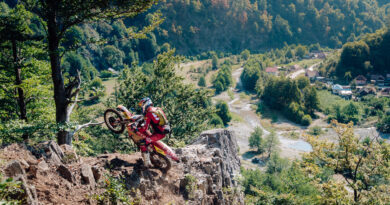
“Severe accidents did not bury the Dunlop family’s passion for motorsports.”
Although the Dunlop dynasty has been accompanied by various tragedies throughout the ages, these have not yet stopped the family’s thirst for speed and competitive spirit. Road racer Joey Dunlop experienced the death of his brother-in-law, who participated in the same race in his first year of racing. His brother Robert experienced the death of his brother Joey, and Robert’s sons experienced the death of their father and uncle. However, Robert’s sons, Michael and William, still compete on the track today.
Published in Estonian Sport magazine, July 2015.
Multiple world champion road racer William Joseph Dunlop, known as Joey Dunlop (February 25, 1952 – July 2, 2000), was a passionate motorcyclist from Northern Ireland. Now, in early July, it marks 15 years since his fatal accident at the Tallinn Pirita-Kose-Kloostrimetsa circuit during the Kalevi Grand Prix, which ended his victorious life. The accident happened on a wet and slippery road in the final turn, where Joey hit a tree, resulting in his immediate death. He was leading the 125 cm³ class race at the time, having already won the 750 cm³ and 600 cm³ races earlier. A year later, a memorial stone was unveiled in his honor before the 40th Kalevi Grand Prix.
Motorcycles sank with the ship.
One indisputable fact about the future of young William Joseph from the small village of Ballymoney in Northern Ireland was that, as an adult, he would have been involved with engines in one way or another. His father, Willie, was a mechanic by trade and naturally a tinkerer and fixer of things. At a time when electricity was not yet commonplace in households, Joey’s father built a wind generator in a tree next to their house. When the traditional North Antrim wind blew, the Dunlop home shone with electric light. Young Joey’s nightly job was to check the battery levels and start the generator if necessary.
Joey’s first motorcycle race was in 1969 in Maghaberry on a Triumph Tiger Cub motorcycle, which he bought for £50 borrowed from a friend. With its 200 cc engine, producing perhaps only 10 horsepower, Joey finished in 16th place, but it was enough to get a taste of road racing and dedicate the rest of his life to it.
With proper racing equipment and a bike, Joey began competing at the age of 19. In this regard, his brother-in-law, Mervyn Robinson, who was also involved in the sport, provided significant support and motivation. Joey almost gave up racing after his first victory at the North West 200, where his brother-in-law died on the track. He seriously considered quitting and canceled all races except for the Formula TT series. After winning that series, he decided to continue. Joey became a world champion in the Formula TT series five times in a row from 1982 to 1986. He is the only person ever to have won the Formula TT world championship five times. Joey won the Isle of Man TT races, held on the Isle of Man between England and Ireland, a record 26 times across all classes. In 1985, 1988, and 2000, he won the series in three different engine classes.
At the Isle of Man races, Joey used to travel with friends on a converted small fishing boat, M.F.V. Tornamona. On the last Sunday of May 1985, while traveling the traditional sea route with his brother Robert, friend Brian Reid, a couple of passengers, and the crew, a fortunate accident occurred. After a stormy night and in the early morning hours just before the harbor, a large wave threw their boat against rocky reefs, breaking the starboard side. The boat sank quickly, but with Joey’s help, the entire 13-member crew escaped to the lifeboat. The racing equipment and five racing motorcycles on board sank to the bottom. Divers later found the sunken ship; the motorcycles were recovered and restored. The cold-blooded Joey did not let this accident ruin his race day – one of his Honda racing bikes had arrived on another ship. While such an incident might have rattled many other racers, Joey shrugged off the inconveniences and delivered another thrilling and successful race.
Joey brought food to Romanian orphans.
Joey had many successful races in his life. He won the Ulster Grand Prix, held in his hometown, 24 times. The North West 200 race, 13 times. For his sporting achievements, he was awarded the Order of the British Empire in 1986. Even after his death, he has been honored with various titles. In 2005, the publication “Motorcycle News” ranked Dunlop as the fifth greatest motorcyclist of all time. At the end of last year, Joey was voted the third-best athlete in Irish history by the Irish public. This January, readers of the Belfast Telegraph voted Joey the best athlete in Northern Ireland overall.
In 1996, he was awarded the Order of the British Empire for organizing charity work. This is perhaps a lesser-known fact about Joey’s life: how he always delivered truckloads of humanitarian aid and food to orphans and their caregivers in Romania and Bosnia before the racing season started. He never allowed any cameras or journalists to accompany him on these missions. Joey himself has said that he felt even more pride in the honor given by the British government for his charity work than any trophy won from a race.
The racer was also very superstitious: he wore a yellow helmet and a red shirt at every race, and his favorite number was three. Joey’s longtime mechanic, Sam Graham, has said that Joey sometimes talked to fairies and waved to magpies while driving to races in his van. “Unfortunately, stone walls and trees don’t care much about a racer’s superstitions. Joey simply couldn’t stop racing, even after achieving the greatest victories. For example, in 2000, he won the TT series at the age of 48, and just a month later, he died. Against a tree. Even after thousands of times sitting on a motorcycle, it only takes a split second for something to go wrong,” Graham told BBC Sport after Joey and his brother Robert’s deaths in 2008.
In Ireland, 50,000 mourners from across the British Isles attended Joey Dunlop’s last journey. Joey was a very private and modest man who spent his last night on this earth sleeping on the front seats of his van. He didn’t even want to take a hotel room in Tallinn to avoid causing a stir with his famous name. “I never wanted to be a superstar, I just wanted to be myself and hope that people remember me that way,” Joey once said about himself.
Joey was married to his childhood friend Linda. They had five children: Julie, Donna, Gary, Richard, and Joanne. All the children still work in Joey’s bar in Ballymoney, where two superbikes are hung from the ceiling.
Brother Robert also earned many trophies.
Joey’s younger brother, Stephen Robert Dunlop (November 25, 1960 – May 15, 2008), was also a Northern Irish motorcycle road racer. Like his older brother, he, too, died due to an accident on the track. During the qualifying race for the annual North West 200 race in Northern Ireland, Robert lost control of his bike at a speed of 250 km/h and crashed heavily. On his specially modified bike, the clutch and front brake were operated by the same hand, and he mistakenly grabbed the brake instead of the clutch, causing him to fly over the handlebars at high speed. Fellow racer Darren Burns also crashed as a result of Robert’s fall but only suffered a concussion and a broken leg. Robert was rushed to the hospital, but his chest injuries were too severe, and he died. Robert is survived by his wife Louise and three sons, Daniel, William, and Michael, the latter two of whom are also road racers.
Robert began competing at the age of 19 in 1979. His first race was the Temple 100, where he made his debut. The following year, he was already competing on a 347 cc Yamaha at the Cookstown 100. A year later, his results were so good that various companies fully sponsored his races.
His first significant victory came in 1985 at the Cookstown 100 on a 250 cc bike. An average speed of almost 142 kilometers per hour brought him the checkered flag ahead of Gary Cowan and Noel Hudson. His most successful year was 1987, when he won the “Man of the Meeting” race in the 125 cc, 350 cc, and 1000 cc classes. He also won the 125 cc class in 1988, 1989, 1991, and 1993. He won the Macau Grand Prix in 1989 on a 500 cc Honda, beating competitors on more powerful 750 cc Hondas.
In 1990, he joined the JPS Norton racing team with the RCW588 bike, which had a Wankel engine. On this bike, he won one stage of the MCN Supercup on a short circuit. He finished second at the North West 200 in Ireland and third in the F1 Isle of Man TT.
In 1994, Robert sustained serious injuries at the Isle of Man Formula One TT race when the rear wheel of his 750 cc Honda broke during a long left-hand curve just after a jump over a bridge, causing him to crash into a stone wall at 240 kilometers per hour. Although he suffered numerous injuries, he was lucky to survive such a high-speed crash. Multiple surgeries and long months in the hospital left Robert sidelined for the 1994 and 1995 racing seasons.
Many thought his racing career was over, as the accident left him with severe impairments that hindered his mobility, and one leg was shorter than the other due to the injuries. Accepting his injuries and limited capabilities, he eventually managed to qualify in the 125 cc class and was allowed to return to the track. On April 20, 1996, he competed in the Cookstown 100 race and finished ninth in the 125 cc class, a race won by his brother Joey. Robert himself said that with an arm basically torn to pieces, you suffer a lot; think about quitting, but then you heal and return to the track. Robert could never win that race again but always participated in the 125 cc class. His best results after the accident at the Cookstown 100 were third in 1997, fourth in 1998, third in 2002, and second in 2004.
Due to severe injuries and his shorter leg hampering his ability to compete properly and causing pain, Robert announced in 2003 that the 2004 season would be his last. He hoped to win the Isle of Man TT and North West 200 before retiring and focusing on teaching his sons.
Sons witnessed father’s accident
In the winter of 2005, he was selected as the first person inducted into the Irish Motorcycle Hall of Fame. At this event, he announced that he had spent some time in the hospital and had his shorter leg operated on again to make it longer, and if everything recovered well, he planned to return to the track for the 2006 season. The man consoled himself with the thought that he would rather die on a bike than lie in the hospital for months without results but should still die from injuries. He returned to the track during the 2005 season. He claimed his 15th victory at the North West 200 in 2006 – the Dunlop brothers have both won a record number of races at this event.
The North West 200 is one of the fastest circuits in the world for bikes on the north coast of Northern Ireland. On May 15, 2008, it became fatal for Robert when a deadly crash occurred. His sons William (29) and Michael (26) were riding behind their father in that race when it happened. They saw their father flying off his bike. Michael held his father’s hand at the side of the track and prayed that everything would be okay. William spent the following night tinkering with his bike in the garage to make it even faster.
The next day, both sons were in the pit, decisively racing, hoping to win in honor of their father. William was then 22 years old. The thirst for competition runs in this family’s blood. William said at the time that he didn’t want to think about his father’s memory but just wanted to race and go fast. “It sounds selfish, but that’s how it is,” he told BBC Sport.
Son William has said: “You think it will never happen to you – you will always be the one to get away from it.” Unfortunately, his father and uncle did not. “It’s a drug,” says William, “that’s why my father couldn’t simply step out of this world, even with such severe injuries, and when he returned, he was no longer the strong competitor he once was. At the time, I wondered why he was doing it, but now I understand him.”
William also had an accident where he broke a bone in his left leg. As soon as it healed, he got back on the bike. He admits that those who engage in such an activity are very selfish. “It’s a nice way to always hang on the edge; I don’t care about anything. If I had a child, maybe that would change my thinking, but I don’t see myself starting a family in the future.” Michael also says that people should not judge their lifestyle because they do not judge others. Michael has won 11 races at the Isle of Man. “I don’t care what people think; the media can write whatever, but journalists and readers have no idea what a racer feels deep inside. As long as you haven’t experienced it yourself, it’s impossible to describe that feeling,” says Michael.
Sources: internet, Wikipedia, joeydunlop.uk.com, BBC Sport.




